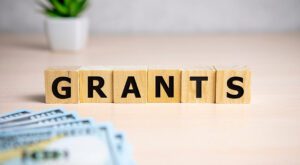
A grant from the Federal Republic of Germany in the amount of EUR1 billion went to the state budget of Ukraine, the Ministry of Finance of Ukraine reported on Friday.
“The grant funds were transferred to the state budget through a special administrative account opened by the International Monetary Fund to send money from donor countries to help Ukraine,” the ministry said in a press release.
According to him, the proceeds will be used to finance priority budget expenditures during martial law.
In total, since the beginning of the war, Ukraine has already received EUR1.3 billion from Germany to support the financial and budgetary system, the Finance Ministry said.
Earlier this week, the Treasury announced that it had received a EUR446.8 million loan from the World Bank (WB) with a UK guarantee for EUR424.6 million, a US grant of $1.3 billion through a WB multi-donor account, and a loan from Japan for the equivalent of about $500 million.
In April 2022, the IMF decided to create an administrative account for crediting funds as part of the Special Drawing Rights (SDR) from donor countries in favor of Ukraine. All funds raised using this account should be used to maintain the financial stability of Ukraine in the form of grants or credits (loans).
Germany became the second country to use this tool, after Canada, which provided a concessional loan of 1 billion Canadian dollars (the equivalent of $773 million) in the first half of June.
The government estimates the budget’s monthly deficit financing needs at $5 billion. Finance Minister Serhiy Marchenko previously predicted that international financial support for Ukraine would increase to $4.8 billion in June from $1.5 billion in May, and thanks to funds received at the end of the month, it was close to this amount. According to the head of the Ministry of Finance, in July the government expects to maintain the same significant volumes of external financing as in June. In particular, the second tranche of a US grant of approximately $1.3 billion and an EU loan of EUR1 billion are expected to arrive.
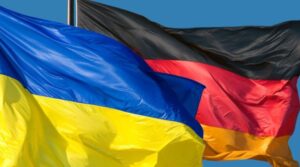
Germany will allocate EUR1 billion in grant funding to Ukraine for priority government spending, the corresponding agreement between the governments was signed on June 24, Minister of Finance of Ukraine Serhiy Marchenko told
“I thank my friend German Finance Minister Christian Lindner for the speed in implementing this important decision. This financial support is more important than ever and will bring our victory closer,” the head of the Ukrainian Ministry of Finance wrote on Facebook.
Earlier it was reported that these funds from Germany, presumably, will be provided through a special account administered by the International Monetary Fund (IMF).
In April 2022, the IMF decided to create an administrative account for crediting funds as part of the Special Drawing Rights (SDR) from donor countries in favor of Ukraine. All funds raised using this account should be used to maintain the financial stability of Ukraine in the form of grants or credits (loans).
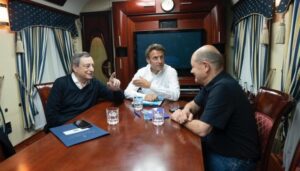
French President Emmanuel Macron, German Federal Chancellor Olaf Scholz and Italian Prime Minister Mario Draghi have arrived in Ukraine.
A photo of the leaders of France, Germany and Italy on the train was posted on the Telegram channel of Ukrazilaznytsia on Thursday morning.
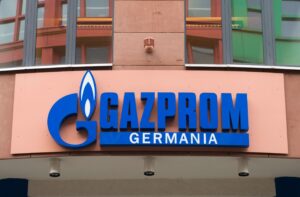
The German government has decided to extend the term of trust management of the gas company Gazprom Germania GmbH for the period and after September 2022 and rename it Securing Energy for Europe GmbH.
“The Office of the Federal Chancellor, the Ministry of Economics and Climate Protection and the Ministry of Finance have decided to extend the trust management of Gazprom Germania GmbH (GPG) until September 2022 and beyond. Specifically, the trust management is designed to ensure energy supply and must comply with the provisions of the amendments to the energy security law,” it said. in a statement from the German government.
Earlier, the German government decided to transfer the management of the company to trustees by the end of September 2022.
In addition, a rebranding is planned.
“Gazprom Germania GmbH will be renamed Securing Energy for Europe GmbH (SEFE). This will send a clear signal to the market that the goal of the measures taken is to ensure energy security in Germany and Europe. This is what the SEFE production model will be designed for,” the report says. .
A credit loan from KfW bank will help to avoid the bankruptcy of the enterprise and the “cascading” effect on the market, the Cabinet of Ministers indicates.
In early April 2022, the German Ministry of Economy instructed to transfer Gazprom Germania under the control of the Federal Network Agency. The head of the ministry, Robert Habek, justified the decision with the company’s non-transparent legal relations and violation of registration rules. The decision was valid until 30 September.
Earlier, Gazprom reported that it had ceased to control Gazprom Germania and all its assets. We are talking about the WINGAS/WIEE distributor, the astora storage operator.
In 2019, the consolidated turnover of Gazprom Germania amounted to 24 billion euros, in 2020 – 13 billion euros.

Import volumes from Russia to Germany have continued to grow since the beginning of 2022, while trade between Germany and Ukraine has fallen, Ukrainian Ambassador to Germany Andriy Melnyk said.
“This is madness. Despite the Russian aggressive war, in January-April 2022, Germany increased imports from Russia by 60% (!) and transferred almost 6 billion euros more to Moscow. Trade between Ukraine and Germany fell by 11%,” Melnyk wrote on Twitter.
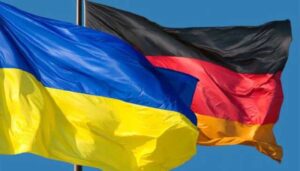
Defense Minister Oleksiy Reznikov discussed with German Defense Minister Christine Lambrecht a package of military assistance to Ukraine from Germany.
“We had a productive meeting of the VTC with German Federal Minister of Defense Christine Lambrecht. We discussed the essence of the upcoming security assistance package from Germany to Ukraine. I look forward to the promised support. Thank you for staying with Ukraine,” Reznikov wrote on Twitter on Friday night .